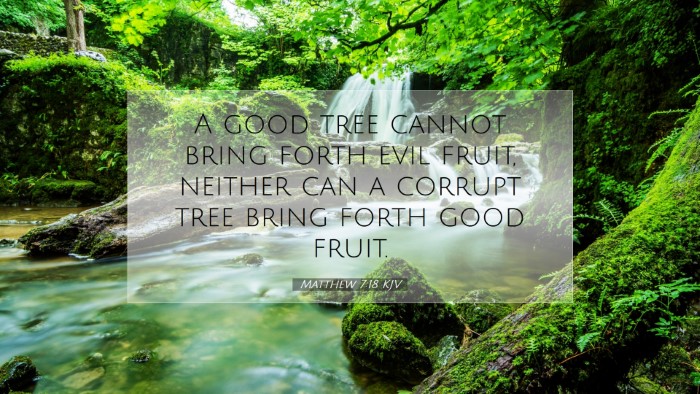Commentary on Matthew 7:18
"A good tree cannot bring forth evil fruit, neither can a corrupt tree bring forth good fruit."
Introduction
This verse, situated in the midst of Jesus’ Sermon on the Mount, underscores the essential truth regarding moral and spiritual fruitfulness. As scholars and commentators have noted, the metaphor of trees and their fruits serves to illustrate the visible manifestations of a person's character and the authenticity of their faith.
Exegesis and Insights
Matthew Henry states that the essence of this verse is the principle of moral consequence. A fruitful tree symbolizes a righteous individual whose actions and character are consistent with a life of integrity and holiness. Conversely, a corrupt tree signifies the hypocrisy often seen in those who profess faith but fail to exhibit godly behavior.
Albert Barnes elaborates on this analogy by noting that just as different trees yield different types of fruit, so too, the actions of individuals reveal their true nature. Good fruit emerges from a good heart, which has been transformed by God's grace. Hence, one’s life is a reflection of the inner spiritual condition.
Adam Clarke further emphasizes that the tree is known by its fruit, encouraging the faithful to examine their lives closely. He insists that it is crucial for believers to produce fruits that are in line with repentance and faith, as these fruits are the evidence of a regenerate heart.
Theological Implications
-
Transformation of Character:
The transformation that occurs upon embracing faith is foundational for producing good fruit. A genuine relationship with Christ results in a radical change, impacting thoughts, intentions, and actions.
-
Discernment:
This verse serves as a reminder to exercise discernment in evaluating both our lives and the lives of others. Recognizing the outer signs of spiritual integrity can often point to the underlying spiritual realities.
-
Accountability:
The metaphor underscores our accountability to God. The expectation of bearing fruit leads to self-examination and a sincere pursuit of holiness.
Practical Applications
For pastors, this scripture challenges the delivery of genuine messages that encourage their congregations towards authentic spiritual growth. It serves as a sobering reminder to both leaders and laypeople that actions must align with professed beliefs.
Students and scholars are invited to engage with this text critically, exploring its implications within different contexts of faith traditions. It enables discussions around ethos and character formation in educational settings.
Furthermore, theologians can delve into the broader implications of this passage concerning the nature of grace and works. It opens avenues for dialogues regarding salvation, sanctification, and the evidence of faith expressed in one's life.
Conclusion
Matthew 7:18 encapsulates a vital theological truth: the connection between one's inner spiritual state and outward actions. Drawing from the insights of Matthew Henry, Albert Barnes, and Adam Clarke, it becomes clear that Jesus' teaching transcends mere ethical behavior, calling each believer to examine the fruit of their lives regularly. Such framework fosters a deeper relational understanding of faith that is manifestly visible through one's character and deeds.


